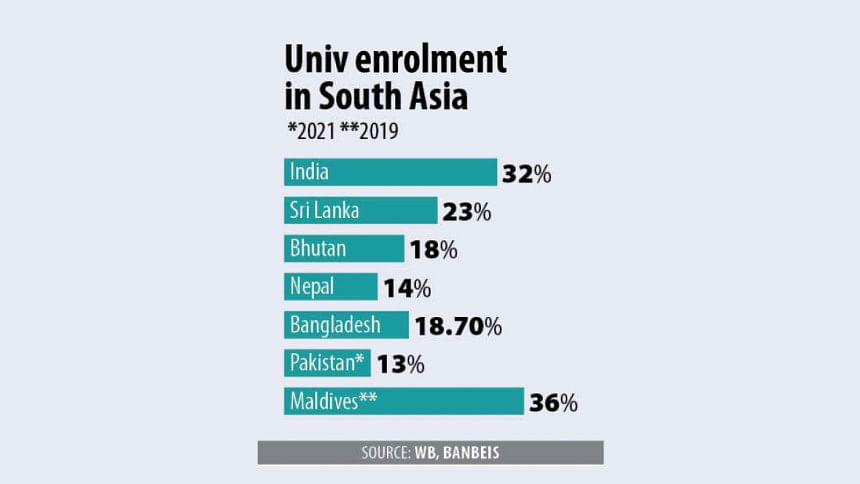University enrolment drops to a 4-year-low

University enrolment, which has historically been lower than the global and the low- and middle-income countries' averages, dropped to a four-year low in 2022 after a small but steady growth for a decade.
In 2022, which is the latest available data from the Bangladesh Bureau of Educational Information and Statistics, admission from higher secondary education to universities came down to 18.66 percent from 20.19 percent in 2021.
The global average for university enrolment was 42 percent in 2022, according to the World Bank. For low- and middle-income countries -- the bracket to which Bangladesh belongs -- the average was 37 percent.
"Education is costly in Bangladesh and it is becoming costlier by the day," said AK Azad Choudhury, a former chairman of the University Grant Commission.
One of the reasons for the drop in enrolment could be the increasing out-of-pocket expenditure, he said.
In Bangladesh, households cover about 71 percent of the total cost of education, according to the Unesco Global Education Monitoring Report 2022.
Despite the huge expenses, employment opportunities upon graduation are limited, Chowdhury said.
"We are opening one university after another but these are not operating keeping the employability of their graduates in mind -- there is an absence of academy-industry linkage."
Graduate unemployment has doubled in five years, according to the Labour Force Survey 2022.
In the Labour Force Survey 2016-17, a total of 390,000 graduates were found unemployed. That number has soared to 799,000 in the latest version of the survey.
The unemployment rate among persons with tertiary-level education rose to 12 percent in 2022 from 11.2 percent in 2016-17.
"Why will students go for higher education if they do not see any light at the end of the tunnel? Higher education in many universities and its affiliated colleges seriously lack quality," Chowdhury added.
The economic hardship caused by the pandemic was one of the main reasons behind the drop in enrolment, said MA Mannan, another former UGC chairman.
Many university students used to meet their study expenses by working as tutors. But they lost that source of income during the pandemic and subsequently dropped out, he said.
Besides, many university students now go abroad in search of quality education, Mannan added.
The number of students going abroad for higher studies has tripled in 15 years.
In 2022, at least 49,151 Bangladeshi students went abroad for higher education in 58 countries, according to the latest Unesco data. It was 24,112 in 2013 and 16,609 in 2008.
Many educationists say the quality of university education in Bangladesh is lagging behind many countries.
Asked about why Bangladesh is behind others, Mannan said: "None can deny that the country's quality of education has not reached the desired level because proper learning and teaching environment could not be ensured."
Another disappointing development is that female enrolment in universities continues to trail behind the males, in a reverse of the scenario that is seen in the case of school enrolment.
In 2015, female enrolment in universities was 12.11 percent against 17.83 percent male. Seven years later, female enrolment increased to 17.19 percent against 20.07 percent for males.
"Higher education is costly and when the question of choice arises on who to send to university, the sons get preference over the daughters in the family," said Rasheda K Choudhury, executive director for Campaign for Popular Education.
Besides, most of the higher education institutions lack facilities like halls for female students.
Muhammed Alamgir, the acting chairman of UGC, has a different opinion: girls drop out of education before the time comes for signing up for university and hence fewer enrolments than boys.
The pandemic-induced financial constraints are to blame for the lower overall enrolment in 2022, he said.
Asked if there are quality issues when it comes to university education, Alamgir said that they are planning to set up a training academy for university teachers to enhance their skills.

 For all latest news, follow The Daily Star's Google News channel.
For all latest news, follow The Daily Star's Google News channel. 



Comments